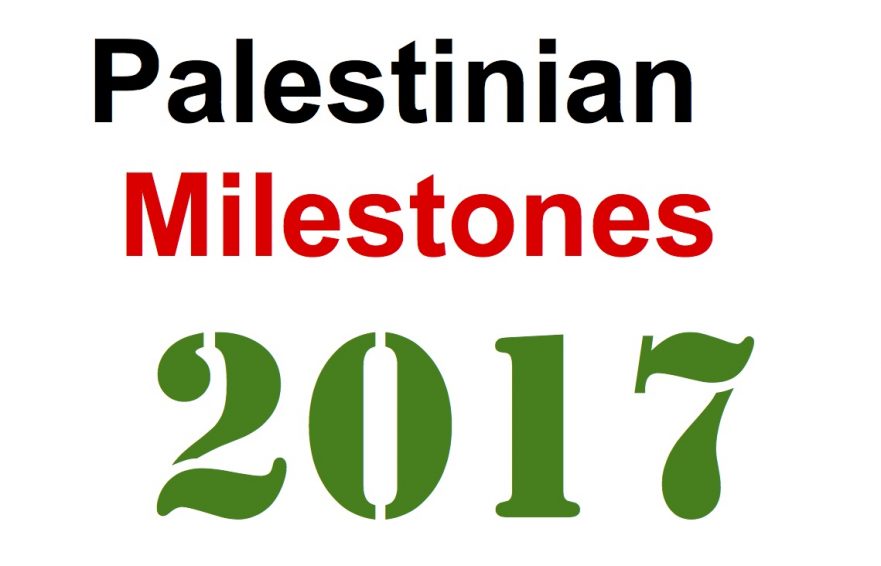2017 will see many anniversaries of great importance for the Palestine Question. The one that comes on June 6, marking the 50th anniversary of the start of Israel’s military occupation of the West Bank and Gaza, is probably the best-known. But 2017 will also see, in November, the 70th anniversary of the UN’s adoption of a wholly anti-democratic Partition Plan for Palestine– an event that, as the historian Ilan Pappe noted, provided what you could call the “starting gun” for the Nakba of the 16 months that followed.
November 2017 will also see the 100th anniversary of the Balfour Declaration… And on a somewhat brighter note, December 2017 will see the 30th anniversary of the outbreak of the movement of civilian mass action known as the First Intifada.
We at Just World Educational see the confluence of these anniversaries as providing a unique opportunity to increase the general understanding of the U.S. public (in particular) of the roots and course of the Palestine Question. We have designed a unique program of community-based public education, “Palestinian Milestones 2017”, that concerned citizen groups, congregations, or student groups can use to broaden public understanding of the Palestine Question. We also hope that PM-17 can serve as a springboard for achieving a rights-based resolution of the Palestinian-Israeli conflict before– we hope– the next decennial, in 2027.
That’s why the sub-title of this project’s name is: “Looking Back, Building Forward.”
The core concept for PM-17 is a one-day conference, comprising four sequential sessions along with a cultural event or luncheon speaker, that would be organized in different cities or on college campuses around the United States in (generally) the second half of 2017. We warmly invite civic organizations, religious networks, and student groups interested in strengthening the struggle for Palestinian rights to make use of our concept and the materials we’ll be producing to support it, such as fact sheets for attendees or media kits you can use to reach out to your local media. We’re also hoping to raise enough funding that we can work with your groups and networks to bring great speakers from Palestine or elsewhere to enrich these discussions.
Let us know if a group you work with is interested!
In some contexts, local organizers may want to use a format other than a full-day conference. They (you) may judge that a half-day conference, or having the four conference sessions spread out into a series of four weekly or fortnightly events, might work better.
We’re flexible! Our main goal is to ensure that the “teaching moment” provided by these anniversaries is used to its fullest in 2017.
What would a PM-17 conference look like?
Here’s our current thinking on the four basic units of the conference:
Session 1: Fifty years of foreign military occupation of the West Bank and Gaza. What impact has this had on Palestinian lives? What does international law say about military occupation? What happened to the “peace process” during these 50 years? What was the role of the U.S. government?
Session 2: Seventy years since the Partition Plan and 100 years since Balfour. Exploring why what happened in 1967 can be seen as not being a radical “break” from what previously existed, but a continuation of a long process of colony-building. The continuing importance of the rights and claims of Palestinians ethnically cleansed from their homeland in 1948.
Session 3: Thirty years since the start of the First Intifada. What that intifada showed about Palestinian capabilities. What Israel’s reaction, including its manipulation of “Oslo”, showed about its continued adherence to a settler-colonial project. What are the legacies of Oslo?
Session 4: Building for a hopeful Palestine by 2027. This would be a more action-oriented session, with people discussing and assessing the strategies that people in the hosting community can use to strengthen the campaign for Palestinian rights.
Where would we organize them?
To a large extent, this depends on the interest we get from partner organizations. We’d like to have PM-17 events in smaller cities as well as in prominent, larger metropolitan areas like Boston, NYC, Chicago, or San Francisco.
One focus might be to hold events in state capitals like Albany, Sacramento, Richmond (VA), Springfield (IL), or St. Paul (MN) where such events could help educate and build state-level activist networks that can have a longer-term impact.
Tell us if you’re interested!
We’re now moving into some more intense planning for this project. Might your organization, church, club, student group, or network be interested in working with us on this? If so, please let us know!

